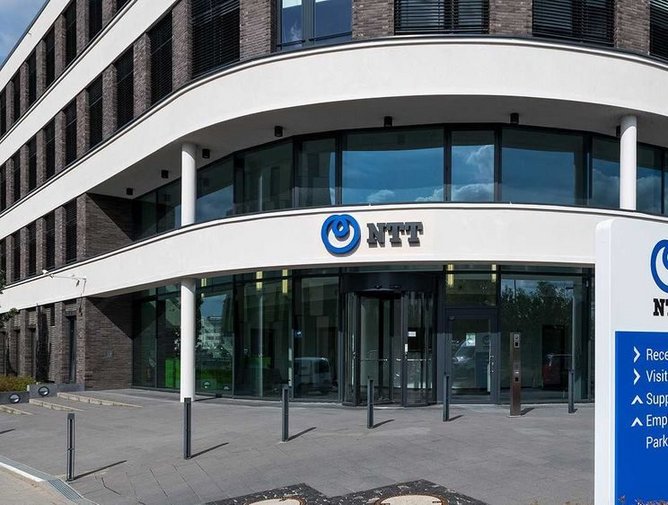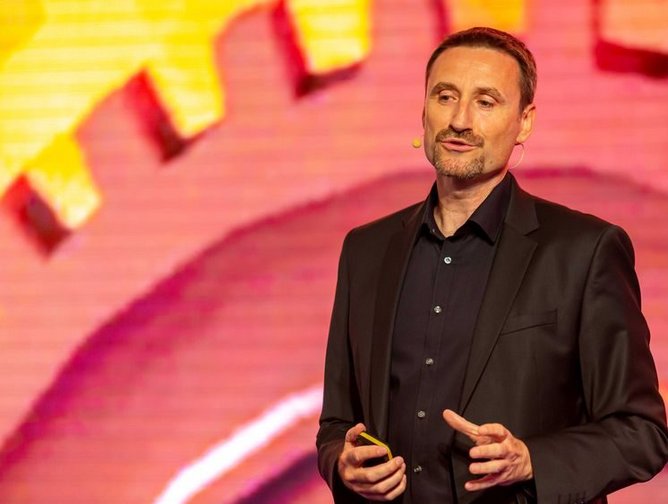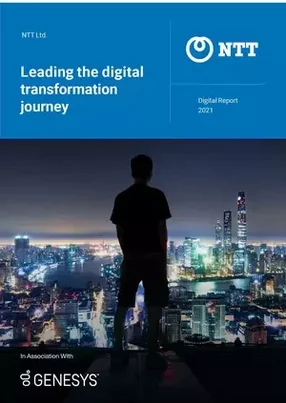“We are enabling the connected future,” says Kai Grunwitz, CEO Germany, NTT. “My passion is making technology meaningful for both businesses and society at large. That’s exactly what NTT does: it’s a company that wants to modernise and transform the business of our clients with the aim of enabling them to do meaningful things.”
Grunwitz sees the digital infrastructure it builds with companies as key to improving business results. “Everything is data-driven, everything is connected, everything is digital, and it has to be secure. Digital infrastructure means everything from data center infrastructure, intelligent networking, agility, HR networks and of course the workplace of today - working from home, online events, video conferencing, collaboration, smart service desks and so on.” NTT sees itself as the technology partner for digital transformation as a whole. “However, it's not only about digital transformation,” Grunwitz warns. “It's also about digital survival. Because if companies are not adapting now, they will disappear”
Grunwitz started his professional career at a consulting company, which was sold to Sun Microsystems. “I became part of one of America’s leading technology companies at that time, before moving on to Oracle when Sun was acquired, taking over the consulting leader role for Northern Europe. Then I had the opportunity at NTT to run the cybersecurity business as Senior Vice President of Cybersecurity EMEA.” Partly thanks to his experience in cybersecurity, Grunwitz emphasises the fundamental nature of security to digital solutions. “As I always say, you will see no digital transformation without cyber security. Digital transformation requires trust in the systems you implement, because it's all about data. Digital solutions and networks are one thing, but it has to be secure. For instance, a remote working environment needs to be innovative and easy to use, but also secure. Therefore, digital transformation goes hand in hand with cybersecurity.”
Emerging technologies such as AI are omnipresent throughout NTT’s offering, with the company having developed its own translation and voice recognition solutions based on AI. “In cybersecurity, for example, there’s a lot of automation to allow more agility in that area. Hospitals are another area, with preventive maintenance solutions to detect problems with medical devices and so on. In customer experience and contact centres, too, there’s a lot we do with chatbots - using AI to change the way you interact with your clients.”
It’s in that customer experience segment that NTT partners with Genesys. “We’re both long-term partners, recognised leaders and experts in supporting clients to maximise their customer experience journeys,” says Grunwitz. “We’ve been working with Genesys for a long period, particularly in traditional on-premise call center solutions. They provide the best solution in that space.” As customer experience itself digitally transforms, moving away from disparate legacy platforms, the partnership is changing too. “Customer experience now needs to be more adaptable. We see cloud-based contact centers as the future, as well as AI-driven, data analytics-informed automation solutions. That’s what we see with Genesys now and the pure cloud approach. It combines good features from the past such as traditional telephony with a modern and agile environment, which is why we see our partnership with Genesys as the backbone of our customer experience business.”
Grunwitz is adamant that technology alone is not sufficient for a successful digital transformation. “You cannot transform without changing the culture and the way you do business, because technology is just one component of the overall transformation. If you're trying to work in traditional analogue business models and processes, and just put technology on top of it, it will fail. Skill development is a key area for that. You need to change the ways people interact and processes are adopted.” NTT also practices what it preaches. “The culture we build has to adapt as well, step-by-step. We are all aware that cultural change is not a sprint - It's a long journey.”
That acknowledgment of the necessity of change has served NTT well during the COVID-19 pandemic. While some projects have slowed, others have become increasingly vital. “One of the areas we see prominently on the roadmap at the moment is everything around the modern workplace and enabling our clients to collaborate most efficiently,” says Grunwitz. That’s not a situation that he expects to be temporary. “We will see a lot of hybrid working in the future - people are more open to new ideas now than they have been in the past. We’re seeing initiatives around smart city and smart mobility approaches, for instance. NTT is at the centre of this discussion, because one of our ambitions is to not only create technology, but to create technology for good.” NTT is duly engaged in projects that align with the UN’s Sustainable Development Goals to support society and transform in a sustainable way.
Going forwards, Grunwitz expects NTT’s business to continue to evolve. “We’re using more of our own IP around managed services such as hybrid cloud and managed security solutions. It's more service driven than it was in the past, with us providing consultancy around innovations and transformation, but always in line with our technology partner landscape.” Grunwitz says the company sees itself as an integrator, combining its own IP with market-leading technologies. “NTT faces the same challenges as our clients. I want to see NTT become the leader for the digital journey in Germany, in a way that also supports sustainable change in society.”



